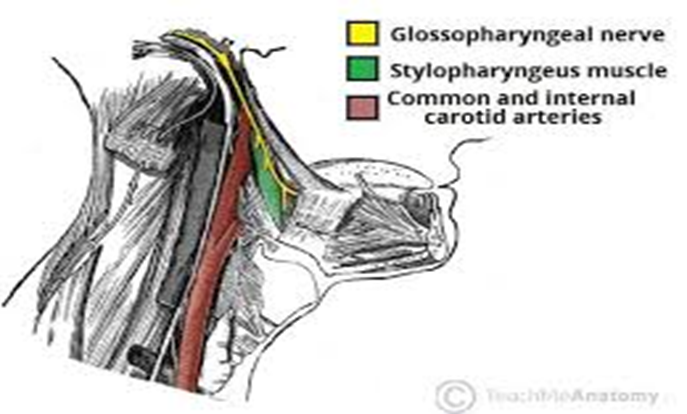What cranial nerve is responsible for the taste sensation of the posterior third of the tongue?

Facial
Abducens
Glossopharyngeal
Hypoglossal
The Correct Answer is C
Choice A Reason:
The facial nerve, or cranial nerve VII, is responsible for the taste sensation in the anterior two-thirds of the tongue, not the posterior third. It carries taste sensations from the front part of the tongue via the chorda tympani branch.
Choice B Reason:
The abducens nerve, or cranial nerve VI, has no role in taste sensation. It is primarily involved in controlling the lateral rectus muscle of the eye, which abducts the eye.
Choice C Reason:
The glossopharyngeal nerve, or cranial nerve IX, provides special sensory innervation for taste to the posterior third of the tongue. This enables the sensation of various tastes like salty, sweet, sour, and bitter in this region.
Choice D Reason:
The hypoglossal nerve, or cranial nerve XII, is responsible for motor control of the tongue muscles but does not provide sensory innervation for taste.
Nursing Test Bank
Naxlex Comprehensive Predictor Exams
Related Questions
Correct Answer is D
Explanation
The correct answer is d) Stage II.
Choice a reason:
Stage IV pressure ulcers are the most severe, with full-thickness skin loss and exposed bone, tendon, or muscle. Signs of stage IV include large-scale tissue loss, possibly including slough or eschar, and may include undermining and tunneling. The scenario described does not indicate such an advanced stage, as there is no mention of exposed deeper tissues or structures.
Choice b reason:
Stage III pressure ulcers involve full-thickness skin loss, potentially affecting subcutaneous tissue but not extending to underlying muscle or bone. The wound may have a crater-like appearance. The described condition does not match stage III, as there is no indication of the ulcer extending into subcutaneous tissue.
Choice c reason:
Stage I pressure ulcers present with intact skin and non-blanchable redness of a localized area usually over a bony prominence. The skin may be painful, firm, soft, warmer, or cooler compared to adjacent tissue. In the given scenario, the skin is not intact, ruling out stage I.
Choice d reason:
Stage II pressure ulcers are characterized by partial-thickness loss of dermis presenting as a shallow open ulcer with a red-pink wound bed, without slough. They may also present as intact or ruptured blisters. The description of the skin condition with erythema, serosanguineous drainage, and a blister-like appearance aligns with a stage II pressure ulcer.
Correct Answer is C
Explanation
Choice a reason:
Rhonchi are coarse, rattling respiratory sounds somewhat like snoring, usually caused by obstruction or secretion in the larger airways. They are not considered normal breath sounds and are typically heard in conditions such as chronic bronchitis.
Choice b reason:
Crackles are the sounds you will hear in a lung field that has fluid in the small airways. These sounds are commonly heard in patients with pneumonia, heart failure, and restrictive pulmonary diseases. They are not normal breath sounds.
Choice c reason:
Bronchovesicular sounds are normal breath sounds heard over the main bronchus area and over the upper right posterior lung field. They have a medium pitch and intensity and are heard on both inspiration and expiration. In a healthy individual, these sounds are expected to be heard in the 1st and 2nd intercostal spaces near the sternal body.
Choice d reason:
Tracheal breath sounds are harsh, high-pitched sounds heard when auscultating over the trachea in the neck. They are not normally heard over the intercostal spaces of the chest wall.
Whether you are a student looking to ace your exams or a practicing nurse seeking to enhance your expertise , our nursing education contents will empower you with the confidence and competence to make a difference in the lives of patients and become a respected leader in the healthcare field.
Visit Naxlex, invest in your future and unlock endless possibilities with our unparalleled nursing education contents today
Report Wrong Answer on the Current Question
Do you disagree with the answer? If yes, what is your expected answer? Explain.
Kindly be descriptive with the issue you are facing.
